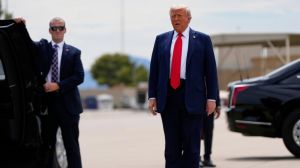Man’s inhumanity to man
Listening to horrific accounts of man’s inhumanity to man at the current session of the Sub-Commission on Human Rights in Geneva is dep...

Listening to horrific accounts of man’s inhumanity to man at the current session of the Sub-Commission on Human Rights in Geneva is depressing. One wonders whether the only thing universal about human rights is their universal violation. That however would be overlooking the vast expansion of the content and dimension of human rights. For example, human rights and bio-ethics, housing and property restitution, prohibition of forced evictions, promotion of the right to drinking water and sanitation. These subjects would have appeared fanciful in the past. Gandhiji’s ardent wish was that every Indian should have access to safe drinking water. The National Commission to Review the Working of the Constitution in its report has recommended as a fundamental right that ‘‘every person shall have the right to safe drinking water’’.
There are mechanisms which have been devised to provide remedies to redress human rights violations. To mention only a few: the Human Rights Committee, the committees under the Convention for Elimination of Discrimination Against Women (CEDAW) and Convention for Elimination of Racial Discrimination (CERD). The Social Forum, which is an initiative of the Sub-Commission, addresses wide-ranging themes which include (a) the interaction between civil, political, economic, social and cultural rights; (b) the relationship between poverty, extreme poverty and human rights in a globalised world; (c) the impact of international trade, finance and economic policies on vulnerable groups, especially minorities, indigenous peoples, migrants, refugees and other similar groups; and (d) the human rights obligations of transnational corporations and business enterprises. Incidentally the question whether multinational corporations and industrial houses which perform functions which affect the community are ‘State’, within the meaning of Article 12 of the Constitution, and are thus subject to the discipline of fundamental rights, arose in the Union Carbide case but the Supreme Court skirted the issue.
In the deliberations of the Sub-Commission, the greatest threat to human rights was perceived to emanate from indiscriminate and mindless acts of terrorism as also from measures adopted purportedly to counter terrorism, which in some cases are in total violation of international human rights standards and the basic principles of the Rule of Law.
Another menace is the virus of Intolerance, which regards any criticism of the Government or opposition of its policies as disloyalty and sometimes as treason. Freedom to dissent and freedom for the thought we hate is an indispensable requirement of democracy and is essential for the progress of humanity. This Intellectual Terrorism must be curbed lest we descend into the Dark Ages and revive the spirit of the Inquisition.
The Sub-Commission expert from UK, Francoise Hampson, focused on situations of alleged human rights violations in three countries—Colombia, Indonesia (its actions in the Aceh region) and the systematic practice of torture in Uzbekistan as found by the Special Rapporteur on Torture. What is striking in these three situations is the common language used by their governments to justify their actions in terms of anti-terrorism measures. They are now all allies in the ‘war on terrorism’, with everything that it entails.
Swinging in Geneva
After the Sub-Commission’s sessions hearing, the ‘Swinging Solicitors’ was refreshing. This group of six successful professionals play the saxophone, piano, acoustic bass, guitar and drums, and with a singer included, provide excellent musical fare ranging from mainstream to near modern. Law and jazz have an affinity. Hoagy Carmichael gave up a flourishing legal practice to become a musician and composed the ever popular Star Dust. Some Indian lawyers may do likewise. Any bets?
Bloomberg’s bloomer
Americans have no doubt made distinctive contributions in the field of science, technology, literature, art and music, especially jazz, whose appeal transcends national frontiers and overcomes linguistic barriers. However, an average American surprisingly knows little of the outside world. A top executive of a well-known American corporation did not believe me when I told him that India has a written Constitution with a Bill of Rights which is enforced by an independent judiciary. The anecdote about President Bush’s anguish that India and Pakistan fought a war three times over a piece of cloth, cashmere, is no doubt apocryphal. But Mayor Michael Bloomberg’s recent bloomer is a historical fact. On May 4, 2004, the Mayor signed a bill to rename 74th Street in Jackson Heights, New York City, as Kalpana Chawla Way. This was done to honour India-born woman astronaut Kalpana, who perished along with six of her colleagues when the space shuttle Columbia exploded during re-entry. Mayor Bloomberg described Kalpana as a ‘‘heroine of two countries’’ and said he was proud to have walked with her on India Day Parade. Actually the woman whom the Mayor accompanied was another Indian-American astronaut, Sunita Lynn Williams, and on that day Kalpana was in the other world. That was indeed Bloomberg’s astronomical gaffe.
Photos





- 01
- 02
- 03
- 04
- 05


























